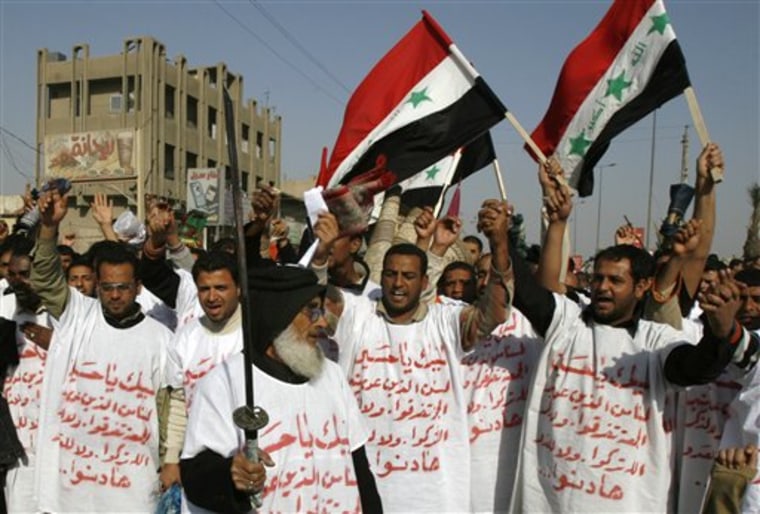Thousands of followers of a radical cleric took to Baghdad's streets after Friday prayers to protest a triple car bombing in one of their southern strongholds and make a show of strength directed at a rival Shiite power broker.
Dancing, chanting and waving their prayer rugs, the supporters of Muqtada al-Sadr made their way through the streets of Sadr City — a teeming Shiite district named after the cleric's late father, Grand Ayatollah Mohammed Sadeq al-Sadr.
On Wednesday, three car bombs went off in quick succession in Amarah, in the Shiite heartland about 200 miles southeast of Baghdad. At least 25 people were killed and dozens wounded. No one has claimed responsibility.
Car bombs are a hallmark of al-Qaida in Iraq, but the group is not known to operate there. However, the area in Maysan province has suffered from violent clashes between competing Shiite militias, including al-Sadr's Mahdi Army.
Tension with other Shiite leader
Despite an agreement between their leaders to work together, tension remains high between al-Sadr and followers of Abdul-Aziz al-Hakim, leader of the largest Shiite party in Iraq.
"Amarah will stay under al-Sadr's influence, whether Abdul-Aziz likes it or not," the protesters shouted.
Al-Hakim has ties with Iran and is one of its staunchest supporters in Iraq, but he also has been a major partner in U.S. efforts to build a democratic system after the collapse of Saddam Hussein's regime in 2003.
During one Friday sermon, Sadrist cleric Suheil al-Uqabi called upon Iraqi forces not to make themselves "swords in the hands of the American occupier against their fellow citizens."
"What had happened in Amarah is an introduction of security operations to purge the Sadr movement in the province," he said.
U.S. Ambassador Ryan Crocker and Gen. David Petraeus, the top American commander in Iraq, condemned the Amarah attack and said the U.S. was working with Iraqi forces to make sure there were enough medical supplies for the victims.
Al-Sadr, whose loyalists hold 30 of parliament's 275 seats, the largest share by a single party, has also clashed with the government of Prime Minister Nouri al-Maliki. But in late August, he ordered his Mahdi Army militia to halt operations for six months, a move seen by many as an attempt to reclaim control of the fighters and weed out mutineers, who favor closer ties to Iran.
Claims of detentions
In Kufa, 100 miles south of Baghdad, Sheik Abdul Hadi al-Mohammadawi, a leading al-Sadr aide, told worshippers that al-Sadr followers were being randomly detained by Iraqi forces in Diwaniyah and Karbala, about 50 miles south of Baghdad, despite government promises to not do so.
"The Sadrists have fulfilled their obligations and frozen the Mahdi Army, but we face a detention campaign from other Shiite powers," he said.
Separately, the U.S. military announced the deaths of two American soldiers — one who was shot to death the day before in an attack in Baghdad, and another who died Friday of injuries from a roadside bombing south of the capital.
